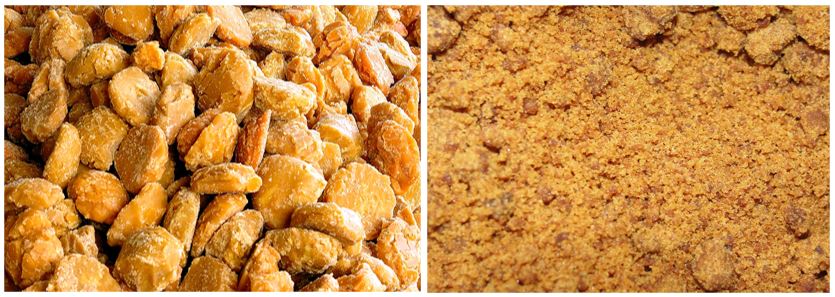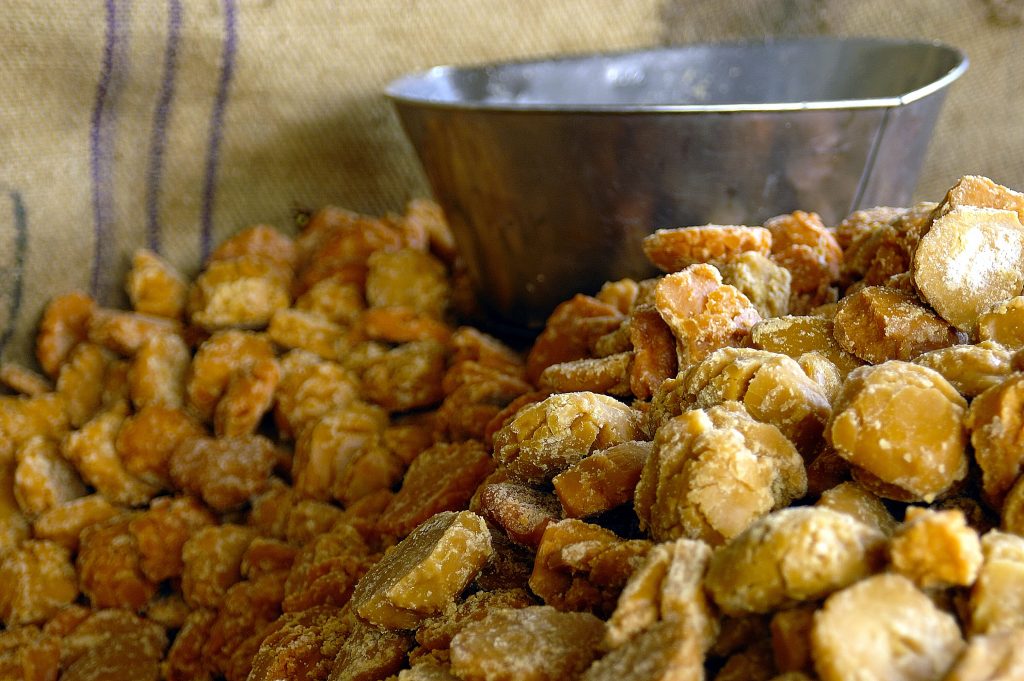
Jaggery is not just for the kitchen. Your skin can also benefit from jaggery. The health benefits of jaggery include its antioxidants and many different nutrients, which help fight free radicals and slow the aging process. The use of jaggery for skin care and hair care have led to many secret ingredients that we would have never thought of in the past. This is good, since natural remedies, as well as home remedies, always surpass modern cosmetic solutions in terms of durability and effectiveness.
The jaggery or gur popularly known as ‘medicinal sugar’ can be beneficial when it comes to treating infections. In addition to being your first resort for overall wellness, you can use jaggery, the pure unrefined sugar as a substitute for your dessert.
Please do have a look at our collection of products prepared using Jaggery:
Gur Mirch Pickle-Sweetness for the Bravehearts
Galgal-Gur Pickle (Khatte ka achaar)
Amla ki Khatti Meethi Launji
Almond and Dates Milk Mix
Homemade Khatta Aampapad
Homemade Meetha Aam Papad
There are a lot of countries in South Asia, Southeast Asia, and elsewhere that use jaggery as a sweetener. Various cultures have been using sugar for different purposes for thousands of years, but the earliest form of indigenous jaggery can be found among India’s Indus Valley Civilization (3200 BC – 1700 BC). It is a type of non-centrifugal cane sugar that is consumed in the Indian subcontinent. It is made by concentrating freshly extracted sugarcane juice to form a sticky, viscous liquid with hints of caramel flavor in the background.
Traditionally, jaggery concentrated form of sugarcane syrup or date or palm sap with molasses and crystals which is golden brown to dark brown in color. They are solid or semi-solid in form and contains 20% moisture content.



Top 5 Beauty Benefits of Jaggery
Jaggery is a 100% natural ingredient without any side effects. Below are 5 ways it can be beneficial for your skin:
1. Treats acne and pimples
A tasty way to stay young and beautiful is to drink jaggery, the cousin of sugar. You can reduce the appearance of dark spots, acne, and pimples by consuming a medium-sized ball of jaggery every day. Moreover, jaggery can also prevent impurities from accumulating and can give you blemish-free skin. Overall, it’s a good treatment for many skin problems.
Please do have a look at our collection of products prepared using Jaggery:
Gur Mirch Pickle-Sweetness for the Bravehearts
Galgal-Gur Pickle (Khatte ka achaar)
Amla ki Khatti Meethi Launji
Almond and Dates Milk Mix
Homemade Khatta Aampapad
Homemade Meetha Aam Papad
2. Prevent hair loss
Iron in jaggery helps prevent hair loss. Having enough iron in your body stimulates the production of hemoglobin, which, in turn, promotes better blood circulation to the roots of your scalp, reducing hair fall and promoting hair growth. Jaggery’s iron content also makes hair smooth and shiny when used as a hair mask.
The average amount of hair that grows per month is an inch. deficiency of iron can slow this growth. As gur contains significant amounts of iron, regular consumption of jaggery promotes hair growth. If you want to see the difference, you should do it every week.
3. Reduces skin wrinkles
The anti-aging properties of jaggery helps to prevent wrinkles. Sesame seeds and essential herbs are often mixed in jaggery to treat premature aging in Ayurveda. With its antioxidant properties (selenium found in jaggery), jaggery fights free radicals in the body and helps delay the aging process. In addition to protecting the cells from aging, jaggery contains other essential nutrients that are effective against many age-related ailments.
4. Moisturizes skin
The moisturizing effects of jaggery are attributed to glycolic acid. All you need to do is make a paste of two teaspoons of honey, lemon juice, and a tablespoon of jaggery. You can apply the mixture to your face and let it dry. Once it has dried, rinse it off with lukewarm water.
Please do have a look at our collection of products prepared using Jaggery:
Gur Mirch Pickle-Sweetness for the Bravehearts
Galgal-Gur Pickle (Khatte ka achaar)
Amla ki Khatti Meethi Launji
Almond and Dates Milk Mix
Homemade Khatta Aampapad
Homemade Meetha Aam Papad
5. Acts as natural cleanser
Jaggery contains a range of minerals and vitamins that act as a natural cleanser for your skin and body. It removes toxins from your body and keeps it glowing, hydrated and healthy. Due to its high antioxidant content, it helps remove harmful toxins and impurities from the blood, giving the skin a radiant appearance.

Final verdict
In addition to its health benefits, jaggery offers beauty benefits. It adds up a lot of benefits to your skin. With the bundle of nutrients and medicinal properties, it is a healthier alternative to refined sugar to keep your skin healthy and glowing. Jaggery is cheaper and easily available in the supermarkets near you. So, feed your sugar craving by replacing sugar with jaggery to add sweetness to your skin and health.
7 Benefits of Jaggery (Gur), click here
For benefits of Amla for Hair, click here
Read 5 Benefits of Apple for the Skin, click here
4 Benefits of Cinnamon for Weight Loss, click here
eos related to Health and Wellness, Subscribe to our YouTube Channel:
Masala Monk – The Gourmet Store
Please do have a look at our collection of products prepared using Jaggery:
Gur Mirch Pickle-Sweetness for the Bravehearts
Galgal-Gur Pickle (Khatte ka achaar)
Amla ki Khatti Meethi Launji
Almond and Dates Milk Mix
Homemade Khatta Aampapad
Homemade Meetha Aam Papad









